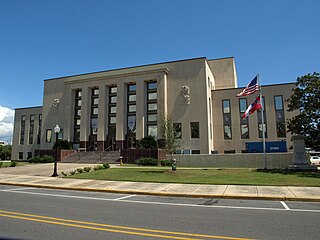
Jackson County is a county located in the U.S. state of Mississippi. As of the 2020 census, the population was 143,252, making it the fifth-most populous county in Mississippi. Its county seat is Pascagoula. The county was named for Andrew Jackson, general in the United States Army and afterward President of the United States.

Moss Point is a city in Jackson County, Mississippi, United States. The population was 12,147 in 2020, a decline from the figure of 13,704 in 2010. The Moss Point Historic District and several individual buildings are listed on the National Register of Historic Places' Jackson County listings.
PotlatchDeltic Corporation is an American diversified forest products company based in Spokane, Washington.
Herron's Mills, originally known as Gillies Mills, is a ghost town in the municipality of Lanark Highlands, Lanark County in Eastern Ontario, Canada, near the community of Lanark. It is located on highway 511 between Perth and Calabogie, Ontario.
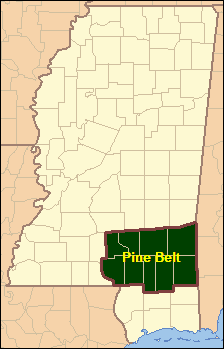
The Pine Belt, also known as the Piney Woods, is a region in Southeast Mississippi. The region gets its name from the longleaf pine trees that are abundant in the region. The Pine Belt includes 9 counties: Covington, Forrest, Greene, Jefferson Davis, Jones, Lamar, Marion, Perry, and Wayne.
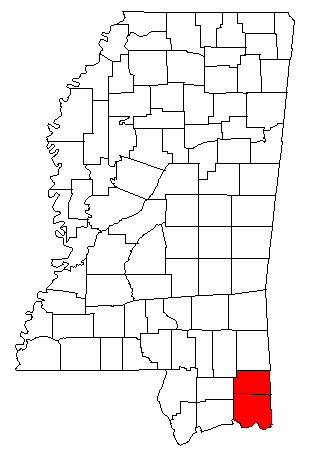
The Pascagoula Metropolitan Statistical Area is a metropolitan area in the southeastern corner of Mississippi that covers two counties - Jackson and George. As of the 2000 census, the MSA had a population of 150,564. The area was significantly impacted by Hurricane Katrina in 2005. A July 1, 2009 estimate placed the population at 155,603. Prior to the hurricane, the area had experienced steady population growth. It is also part of the larger Gulfport-Biloxi-Pascagoula Combined Statistical Area.
The Great Southern Lumber Company was chartered in 1902 to harvest and market the virgin longleaf pine forests in southeastern Louisiana and southwestern Mississippi. Bogalusa, Louisiana was developed from the ground up as a company town and was the location for Great Southern Lumber Company's sawmill, which began operation in 1908. Other company interests included a railroad and paper mill. The company ceased operation in 1938, when the supply of virgin pines was depleted. Bogalusa became the site of a paper mill and chemical operations, followed by other industry.

Griffin House in Moss Point, Mississippi is a Greek Revival building built in the mid-1800s. It is located on a 50-acre (20 ha) property overlooking the joining of the Pascagoula River and the Escatawpa River, about 5 miles (8.0 km) in from the outlet of the Pascagoula to the Gulf of Mexico. It was listed on the National Register of Historic Places in 1983.
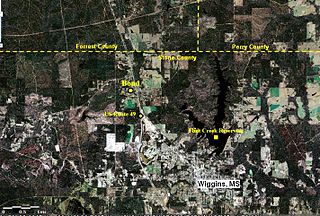
Bond is a census-designated place and unincorporated community in northern Stone County, Mississippi, United States. The community is situated approximately 3 miles (4.8 km) north of Wiggins on U.S. Route 49, and is part of the Gulfport-Biloxi metropolitan area. It was first named as a CDP in the 2020 Census which listed a population of 506.
The Finkbine-Guild Lumber Company was established to harvest and market the virgin longleaf pine stands of southern Mississippi during the early 20th century. The main sawmills were located in Wiggins and D'Lo, Mississippi. When the local timber supply dwindled, the company tried to utilize redwood trees from California, but that operation failed because of high transportation costs. Other attempts were made at promoting a more diversified use of the cutover timberlands; some ventures were successful while others were not.

Brewton, Mississippi is a ghost town in Jackson County, Mississippi, United States.

The Gulf and Ship Island Railroad (G&SI) was constructed in the state of Mississippi, USA, at the turn of the 20th century to open a vast expanse of southern yellow pine forests for commercial harvest. In spite of economic uncertainty, entrepreneurs William H. Hardy and Joseph T. Jones successfully completed railroad construction. The railroad resulted in the development of a seaport and expansion of cities along its route.

The Mississippi Export Railroad (MSE) is a 42-mile shortline railroad founded in 1922 which operates in the state of Mississippi from Pascagoula to Evanston. The company owns a North-South line between its two termini, along which it interchanges with Canadian National and CSX. MSE also connects to the NS in Mobile, AL, and Hattiesburg, MS and KCS in Jackson, MS, through haulage agreements. The MSE also has access to the Terminal Alabama State Docks and the Port of Pascagoula through reciprocal switch.
Fernwood Lumber Company had its beginning in the 1870s when John Fletcher Enochs and his son, Isaac Columbus Enochs, started a lumber business near Crystal Springs in Copiah County, Mississippi. Between 1880 and 1920, Fernwood Lumber Company became one of the largest lumber operations in south Mississippi with investments in timberland, lumber mills, and railroads.
The Brotherhood of Timber Workers (BTW) (1910-1916) was a union of sawmill workers, farmers, and small business people primarily located in East Texas and West Louisiana, but also had locals in Arkansas (7) and Mississippi (1). The BTW was organized in 1910 by Arthur Lee (A.L) Emerson and Jay Smith as an industrial union. Estimates of membership fall between 20,000 and 35,000 people. Despite being located in the Jim Crow South the union was open to members of all races and women were granted membership in 1912. Roughly half of the membership is believed to have been African American. Members of Brotherhood had their work cut out for themselves, organizing an interracial union during Jim Crow in one of the largest industries in the South. Louisiana, Texas, and Mississippi were three of the largest timber producing states in the country during that era.

Charles Waterhouse Goodyear was an American lawyer, businessman, lumberman, and member of the prominent Goodyear family of New York. Based in Buffalo, New York, along with his brother, Frank, Charles was the founder and president of several companies, including the Buffalo and Susquehanna Railroad, Great Southern Lumber Company, Goodyear Lumber Company, Buffalo & Susquehanna Coal & Coke Company, and the New Orleans Great Northern Railroad Company.

The Jackson County Sheriff's Office is a law enforcement agency located in Jackson County, Mississippi, which is responsible of providing law enforcement services to areas of the county that are unincorporated communities which do not have their own local police force. With over 200 officers, it is the largest law enforcement agency in Jackson County.
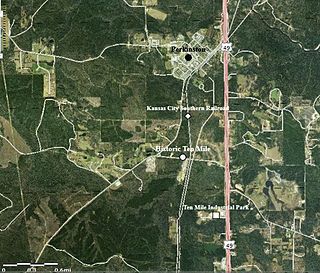
Ten Mile, also known as Tenmile, is an unincorporated community in Stone County, Mississippi, United States, located approximately 1.15 mi (1.85 km) south of Perkinston. Ten Mile is part of the Gulfport-Biloxi metropolitan area. The main period of significance was between 1904 and 1923.

Brooks-Scanlon Lumber Company was a lumber products company with large sawmills and significant land holdings in Minnesota, Florida, British Columbia, and Central Oregon. The company was formed in 1901 with its headquarters in Minneapolis, Minnesota. Beginning in 1915, its main lumber production facility was in Bend, Oregon. For many years, its Bend sawmill was one of the largest lumber producers in the world. In 1969, the company created Brooks Resources to broaden its business base beyond timber production. Brooks-Scanlon's Bend sawmill was closed in 1994. Today, Brooks Resources is the only vestige of the company that is still in business.
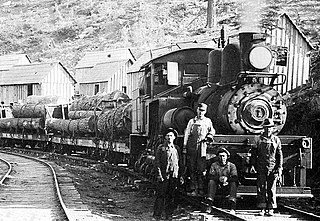
The Yosemite Lumber Company was an early 20th century Sugar Pine and White Pine logging operation in the Sierra Nevada. The company built the steepest logging incline ever, a 3,100 feet (940 m) route that tied the high-country timber tracts in Yosemite National Park to the low-lying Yosemite Valley Railroad running alongside the Merced River. From there, the logs went by rail to the company’s sawmill at Merced Falls, about fifty-four miles west of El Portal.

















